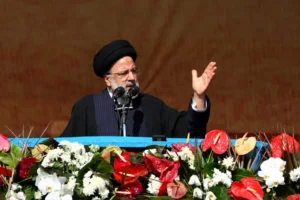
Ebrahim Raisi, the president of Iran, is scheduled to head a sizable team to China at President Xi Jinping’s invitation and is anticipated to leave Tehran late on Monday.
According to Iranian state media, the three-day trip is Raisi’s first state visit to the Asian economic power and the first by an Iranian president in 20 years.
At the Shanghai Cooperation Organization (SCO) conference in Uzbekistan in September, Raisi and Xi first spoke as presidents. China had backed Iran’s now-successful application to join the organization as a full member.
The Iranian president, who took office in August 2021, is traveling with a large delegation that includes the newly appointed governor of the central bank, underscoring his top priorities for the journey.
The group also includes six members of Raisi’s cabinet, including the ministers of the economy, petroleum, foreign affairs, trade, transport and urban development, and agriculture.
In an opinion piece that was published on Monday in a prestigious Chinese journal, Raisi expressed his support for strengthening bilateral ties. After Raisi and Xi meet, there will be negotiations between the delegations, which are anticipated to result in the signing of a number of agreements in front of the presidents.
The primary objective of the trip, according to Mohammad Jamshidi, Raisi’s political affairs deputy, was to “finalise the operational processes” of the 25-year comprehensive cooperation deal that the two nations inked in 2021.
Early in 2022, foreign minister Hossein Amirabdollahian claimed that the agreement had reached the implementation stage. However, as long as Iran is still subject to severe US sanctions, no significant contracts or projects have been announced under the agreement.
According to an Iranian investment official, China made just $162 million in economic investments in Iran during the first year of Raisi’s administration, less than both Afghanistan and Turkey combined. However, China continues to be Iran’s top trading partner; according to Iranian customs figures for the first 10 months of the current Iranian calendar year, which ends in March, Iran purchased $12.7 billion from China and exported $12.6 billion.
Despite US sanctions, China also continues to purchase oil from Iran, though specific amounts are kept secret. Iran’s oil exports reportedly reached new highs in the final two months of 2022 and had a solid beginning to 2023, according to many companies that watch data.
China has indicated it supports Iran’s application to join the influential BRICS bloc, which also includes Russia, Brazil, India, China, and South Africa.
China is a party to the 2015 nuclear agreement between Iran and major powers, including the US, UK, France, and Germany. Washington unilaterally pulled out of the agreement in 2018.
The chief nuclear negotiator for Iran, Ali Bagheri Kani, who has been in talks with the West to revive the agreement, is also there with the Iranian president. However, the early 2021 talks are still in a standstill.
This might be a clue that the visit would likely include significant time for the Joint Comprehensive Plan of Action (JCPOA) negotiations. The US openly insists that the nuclear talks are currently not a priority in the wake of months of deadly protests across Iran and amid allegations that Tehran supplied drones to Russia for use in the war in Ukraine.
Tehran, meanwhile, alleges that signals are frequently exchanged between Washington and Tehran through middlemen in an effort to revive the JCPOA, accusing Washington of being hypocritical.
The Raisi visit also comes soon after Tehran summoned China’s ambassador in December to express “serious unhappiness” over Xi’s contentious joint statement with the leaders of the Gulf Cooperation Council (GCC) nations.
Xi signed the statement that questioned Iran’s ownership of three islands in the Strait of Hormuz and raised issues regarding Iran’s regional presence and nuclear program. Xi has also worked to forge closer ties with other nations in the region, including some of Iran’s Arab rivals.




